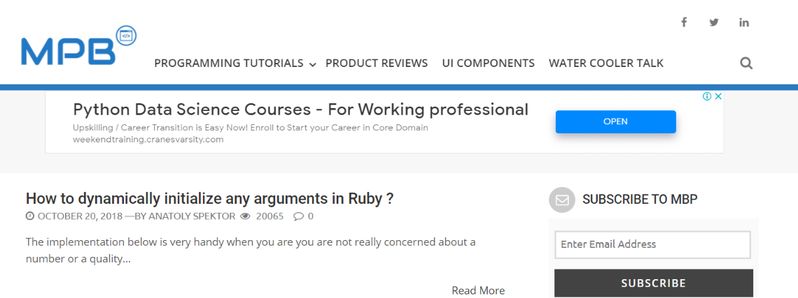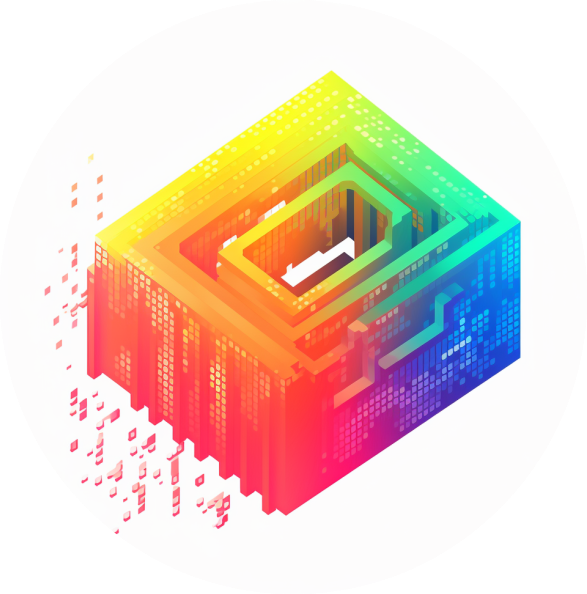“Find Your Coding Mentor on These Blogs and Websites” is an informative article that presents a comprehensive list of 13 programming blogs and websites to help individuals enhance their coding skills. Covering a wide range of programming topics and languages, these resources cater to both beginners and advanced readers. Some notable blogs mentioned include Better Programming, Lynda, David Walsh Blog, CSS Tricks, and NSHipster. The article also provides valuable tips for programming beginners, such as starting with the fundamentals, seeking a programming buddy, and learning through practice. Additionally, it highlights the benefits of running a programming blog, such as improving technical skills, establishing a personal brand, and effectively expressing ideas. With a focus on the importance of continuous coding practice, the article concludes by recommending readers to follow the listed websites to boost their programming abilities. “Let’s learn about codes” prompts readers to embark on a journey of discovery and improvement in the world of coding.
Blogs and Websites to Find Coding Mentors
Finding a coding mentor can greatly enhance your learning experience and help you navigate through the complexities of programming. Luckily, there are numerous blogs and websites available that provide valuable resources and opportunities to connect with experienced programmers. Here are some of the top recommendations:
Better Programming
Better Programming is a comprehensive blog that covers a wide range of programming topics and languages. The platform offers insightful articles, tutorials, and coding challenges, making it an excellent resource for both beginners and advanced programmers. The blog also provides opportunities to connect with mentors and join coding communities, fostering a supportive learning environment.
Lynda
Lynda is an online learning platform that offers a vast library of programming courses taught by industry experts. By becoming a member, you gain access to a wide range of video tutorials that cover various programming languages and concepts. Lynda also provides coding exercise files, quizzes, and forums to enhance your learning experience and help you connect with other learners and mentors.
David Walsh Blog
David Walsh Blog is a popular programming blog that covers a wide range of web development topics. The blog offers in-depth tutorials, code snippets, and tips on CSS, JavaScript, and other web technologies. David Walsh himself is a respected developer and often provides insights into his own coding practices, making this blog a valuable resource for aspiring programmers.
CSS Tricks
As the name suggests, CSS Tricks is a blog focused on Cascading Style Sheets (CSS) and front-end development. The blog offers tutorials, tips, and code snippets related to CSS, HTML, and JavaScript. CSS Tricks also features a strong community of web developers and provides opportunities for mentorship and collaboration.
NSHipster
NSHipster is a blog specifically focused on iOS and macOS development. The blog offers detailed articles and tutorials on Swift, Objective-C, and related programming topics. NSHipster also covers lesser-known APIs and provides insights into best practices, making it a valuable resource for iOS developers seeking to deepen their understanding of the platform.
Codecademy Blog
Codecademy, known for its interactive coding courses, also maintains a blog that offers additional resources and insights. The blog covers a wide range of coding topics, including but not limited to HTML, CSS, JavaScript, Python, and SQL. With contributions from various experts, the Codecademy Blog provides valuable insights and tips to support your coding journey.
SitePoint
SitePoint is a popular platform that offers a wealth of articles, tutorials, and books on various programming and web development topics. The platform covers a wide range of languages, frameworks, and tools, making it a valuable resource for developers at any skill level. SitePoint also provides opportunities to connect with mentors and participate in community discussions.
A List Apart
A List Apart is a leading blog for web professionals, covering topics such as web design, front-end development, accessibility, and user experience. The blog features articles written by industry experts, providing valuable insights and best practices for creating modern and user-friendly websites. A List Apart also offers a platform for connecting with like-minded professionals and mentors in the web development community.
Smashing Magazine
Smashing Magazine is a highly regarded online publication that focuses on web design and development. The publication offers a wide range of articles, tutorials, and resources to help developers stay up-to-date with the latest trends and best practices. Smashing Magazine also provides opportunities for mentorship and community engagement through its forums and conferences.
Stack Overflow
Stack Overflow is a question and answer platform that has become the go-to resource for programmers seeking solutions to their coding problems. The platform boasts a vast community of developers who actively engage in discussions and provide assistance to fellow programmers. By actively participating in Stack Overflow, you can not only find solutions to your coding challenges but also connect with experienced programmers who can mentor and guide you.
Programiz
Programiz is an online learning platform that offers interactive coding lessons and exercises. The platform covers a wide range of programming languages, including Python, Java, C++, and more. Programiz also provides a coding community where learners can connect with mentors and peers, fostering a collaborative learning environment.
CodePen Blog
CodePen is a popular online community for front-end developers, allowing users to showcase and share their code snippets and projects. The platform’s blog provides valuable insights, tips, and tutorials on front-end development, CSS, JavaScript, and related topics. CodePen Blog also features interviews with experienced developers, providing inspiration and guidance for budding programmers.
freeCodeCamp
freeCodeCamp is a nonprofit organization that offers a comprehensive curriculum for learning web development. Alongside its interactive coding exercises, freeCodeCamp also maintains a blog that covers various programming topics, provides coding challenges, and offers guidance on building real-world projects. The freeCodeCamp community is highly supportive and provides opportunities for mentorship and collaboration.

Tips for Programming Beginners
If you’re just starting your programming journey, it’s important to approach it systematically and set yourself up for success. Here are some valuable tips to help beginners get started:
Start with the basics
Before diving into complex languages or frameworks, it’s crucial to build a solid foundation by mastering the basics of programming. Understand fundamental concepts such as variables, loops, conditional statements, and functions. Begin with a beginner-friendly language like Python, which emphasizes readability and simplicity.
Find a programming buddy
Programming can be challenging, and having a like-minded buddy to learn and grow with can be immensely beneficial. Find someone with similar interests and skill levels, and embark on your programming journey together. You can collaborate on projects, troubleshoot issues, and motivate each other to keep learning.
Learn by practicing
The best way to improve your programming skills is through practice. Code regularly and consistently work on projects that challenge you. Learn to break down complex problems into smaller, manageable tasks, and tackle them one step at a time. The more you code, the more comfortable you’ll become with different programming concepts and syntax.
Work on small projects
Starting with small, manageable projects allows you to apply what you’ve learned and gain practical experience. It also helps you build your problem-solving skills and confidence. Choose projects that align with your interests, whether it’s creating a simple website, building a basic app, or automating repetitive tasks.
Join coding communities
Being a part of coding communities can provide valuable support, mentorship, and networking opportunities. Engage in online forums, join local meetups, and participate in coding challenges. Surrounding yourself with like-minded individuals can inspire you to learn, share ideas, and seek guidance when needed.
Take online courses
There is a wealth of online courses available that cater to different learning styles and programming languages. Enroll in structured courses that provide comprehensive learning materials, hands-on exercises, and assessments. Online courses often offer mentorship opportunities to provide guidance and feedback on your progress.
Stay up-to-date with industry trends
The tech industry is constantly evolving, with new frameworks, libraries, and best practices emerging regularly. Stay up-to-date by reading programming blogs, attending webinars, and following influential developers on social media. Being aware of industry trends ensures that you’re equipped with the latest knowledge and skills required in the job market.
Attend coding bootcamps
Coding bootcamps have gained popularity as intensive, immersive programs that fast-track your learning. These programs offer structured curricula, hands-on projects, and mentorship from experienced developers. Attending a coding bootcamp can provide you with a strong foundation and accelerate your progress in becoming a programmer.
Participate in coding challenges
Coding challenges and competitions are a great way to hone your skills, solve problems, and benchmark your progress. Platforms like HackerRank, LeetCode, and Codeforces host regular coding challenges that allow you to tackle algorithmic problems and compete against other programmers. Participating in coding challenges pushes you to think critically and learn new strategies.
Read documentation and tutorials
Learning to read and interpret documentation is an essential skill for programmers. Familiarize yourself with the documentation and official guides of the programming languages and frameworks you’re interested in. Tutorials and online resources can also provide valuable insights into specific topics and help you grasp complex concepts more effectively.

Benefits of Running a Programming Blog
Running a programming blog can offer numerous advantages for both beginners and experienced programmers. Here are some key benefits of starting and maintaining a programming blog:
Enhance technical skills
Writing blog posts about programming topics requires deep understanding and research. By explaining concepts, writing code samples, and providing tutorials, you reinforce your own knowledge and gain a deeper understanding of the subject matter. This process helps you solidify your technical skills and improve your problem-solving abilities.
Create a personal brand
A programming blog serves as a platform to showcase your expertise and establish yourself as a knowledgeable professional. By consistently sharing valuable content, you establish credibility and develop a personal brand within the programming community. Your blog can become a go-to resource for other developers seeking guidance and insights.
Build a portfolio
Employers and clients often look for evidence of practical experience and skills when evaluating programming candidates. By showcasing your blog posts and code samples, you build a portfolio that demonstrates your expertise and passion for programming. A portfolio can help you stand out from other candidates and increase your chances of landing job opportunities or freelance gigs.
Improve writing and communication skills
Writing blog posts requires you to explain complex concepts in a concise and understandable manner. By consistently writing about programming topics, you develop your writing and communication skills. Clear and effective communication is crucial for collaborating with teams, documenting code, and explaining technical concepts to non-technical stakeholders.
Share ideas and knowledge
A programming blog provides a platform to share your ideas, insights, and discoveries with a wider audience. By sharing your experiences, tips, and tutorials, you contribute to the programming community and help other developers overcome challenges. This exchange of knowledge fosters continuous learning and encourages collaboration within the programming community.
Connect with like-minded individuals
Through your programming blog, you have the opportunity to connect with a community of like-minded individuals who share similar interests and passion for programming. Engaging with readers, responding to comments, and participating in discussions can lead to valuable connections, mentorship opportunities, and collaborative projects.
Receive feedback and constructive criticism
Publishing blog posts invites feedback and constructive criticism from readers, which can help you refine your ideas and improve your coding practices. Constructive feedback can provide new perspectives and insights that enhance your understanding of programming concepts and encourage growth. Embracing feedback and actively seeking input from the community can accelerate your learning and development.
Become a thought leader in the industry
Consistently publishing thought-provoking and insightful content can establish you as a thought leader in the programming industry. As your blog gains traction and recognition, you may receive invitations to speak at conferences, contribute to industry publications, or even mentor aspiring programmers. Your expertise becomes sought after, and you play a role in shaping the direction of the industry.
Stay motivated and accountable
Maintaining a programming blog provides a sense of accountability and motivation. Knowing that you have an audience eagerly awaiting your next blog post can push you to stay disciplined and continuously expand your knowledge. Regularly sharing your progress and achievements with others keeps you motivated to set and achieve coding goals.
Document and showcase coding journey
A programming blog can serve as a personal journal, documenting your coding journey and milestones. By regularly reflecting on your progress, challenges, and successes, you develop self-awareness and gain valuable insights into your learning process. It also allows you to showcase your growth over time and serves as a testament to your dedication and commitment to programming.

Conclusion
In conclusion, continuous coding practice is essential for mastering programming concepts and staying relevant in the ever-evolving tech industry. By following the recommended blogs and websites discussed in this article, you can access valuable resources, connect with mentors, and engage with coding communities. Remember to start with the basics, find a programming buddy, practice regularly, and work on small projects to solidify your skills.
Running a programming blog not only enhances your technical abilities but also helps you create a personal brand, build a portfolio, and improve your writing and communication skills. Sharing ideas, connecting with like-minded individuals, and receiving feedback from the community further enrich your learning experience. Embrace the iterative learning process, set realistic goals, and seek mentorship and guidance to accelerate your programming journey.
Lastly, never forget the importance of perseverance and regular coding. With dedication, continuous learning, and the support of the programming community, you can unlock your full potential as a programmer and achieve your goals. So don’t wait any longer – start coding, keep learning, and embrace the exciting world of programming!

